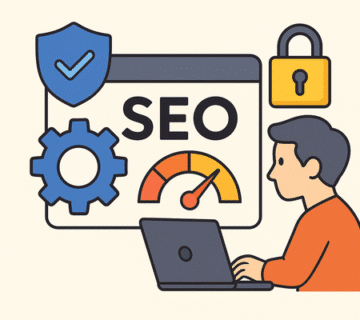
The Importance of Search Engine Optimization (SEO)
What is SEO?
Search Engine Optimization (SEO) refers to a set of strategies and techniques used to improve the visibility of websites in search engine results.
This involves various activities, such as content optimization, website structure enhancement, and link building, with the aim of increasing web traffic and improving page rankings. Search engines like Google and Bing are the primary tools users rely on to find information and services online.
Search engines operate through a complex process involving crawling websites, indexing content, and ranking results based on relevance and quality. When a user enters a search query, the engine retrieves the most relevant and authoritative pages from its index.
SEO strategies help ensure that websites appear on the first pages of search results, increasing their chances of being discovered and visited.
SEO plays a direct role in boosting brand awareness, as sites that appear among the top results are more likely to be noticed and clicked on. Applying SEO strategies also strengthens competitiveness, allowing businesses to reach wider audiences and achieve their commercial goals more effectively. In today’s digital marketing landscape, SEO is no longer optional — it’s essential.
Benefits of SEO for Businesses
SEO is a fundamental tool that can greatly contribute to business success in the digital age. Among its many benefits is the increase in website traffic.
Well-optimized pages are more likely to appear in top search results, attracting a greater number of visitors and potential customers.
SEO also contributes to improving user experience. Effective SEO techniques involve optimizing website design, improving load speed, and offering valuable content — all of which create a smoother user journey and increase the time visitors spend on your site, positively impacting conversion rates.
When users easily find what they’re looking for, the chances of completing a purchase or taking desired actions are higher.
Moreover, SEO helps build a strong online reputation. Brands that appear consistently in search results are perceived as more trustworthy. This trust enhances customer loyalty and plays a key role in driving continuous sales.
SEO also complements other digital marketing strategies. When integrated with social media marketing or paid ad campaigns, it can produce even better results. Ultimately, adopting SEO provides a lasting competitive advantage and supports the long-term success of any business.
Key Factors in SEO
SEO is a dynamic process aimed at improving website visibility in search results. There are several critical factors that digital marketers should focus on to achieve effective results.
One of the most important factors is keyword usage. Content must include relevant keywords that reflect what users are searching for. These keywords should be integrated naturally into the text, headings, and links to help search engines better understand the content and direct users accordingly.
Another major factor is the quality of backlinks — links from other websites pointing to your content. When these links come from reputable sources, they boost your website’s credibility and authority. Marketers should develop backlink-building strategies, such as collaborating with blogs or creating content that is inherently valuable and link-worthy.
Page load speed is also a key SEO factor. Slow websites often result in poor user experiences and lower rankings. Optimizing speed through image compression and caching techniques is essential.
Meta descriptions and meta tags play an important role too, as they inform search engines about page content. Well-written meta tags help attract clicks and improve how your content appears in search results.
Finally, quality content remains the heart of SEO. Your content should be relevant, well-structured, and tailored to meet the needs of your target audience. High-quality content has a powerful impact on search rankings and audience engagement.
Current SEO Trends
SEO trends continue to evolve with technological advances and shifting user behaviors. One of the most significant trends today is the use of artificial intelligence (AI).
AI enhances the accuracy of search results and enables content personalization. Through big data analysis and machine learning, AI delivers tailored content suggestions, ensuring users see the most relevant information. Businesses must now incorporate AI tools into their SEO strategies to stay competitive in personalized search experiences.
Voice search optimization is another growing trend. Many users now prefer speaking to their devices rather than typing, which requires marketers to focus on long-tail keywords and more natural, conversational phrases.
This shift necessitates content restructuring to align with voice search behavior and increases the chances of appearing in voice assistant results. Businesses should consider how to optimize their content for this rapidly growing audience segment.
Finally, user experience (UX) plays a central role in modern SEO effectiveness. Search engines prioritize sites that are fast, easy to navigate, and user-friendly. Data shows that websites offering a better experience tend to rank higher.
Thus, investing in UX design and site performance is critical for attracting users and increasing visibility in search results.





Love this! It empowers marketers to understand what’s working, what’s not, and how to improve SEO performance effectively.
Great reminder! SEO-friendliness is the difference between being online and being found online
“Love this! It’s a go-to solution for writers, students, and marketers who care about content quality and authenticity.
So valuable! Keeping abreast of SEO trends for 2025 helps in crafting content that aligns with current search engine algorithms and user behaviors.
This topic is next-level — it’s not just about tools and keywords, but about creating with purpose and search intent in mind!
ممتاز! متابعة تحديثات خوارزميات جوجل بتخلي موقعك دايمًا في القمة ومواكب للمعايير الحديثة.
This is foundational knowledge! SEO is like the compass that guides all other digital marketing efforts in the right direction.
This is digital marketing 101 — knowing the types of e-marketing helps tailor campaigns to every audience and goal!
This topic hits the mark! It’s all about working smarter to rise in rankings and outshine competitors.
Such a proactive mindset! Staying on top of website speed means you’re always ready to impress and convert.
A strong website design can turn casual visitors into loyal customers — such a powerful business asset!
A perfect starting point for digital success! Mastering SEO basics lays the foundation for long-term visibility.